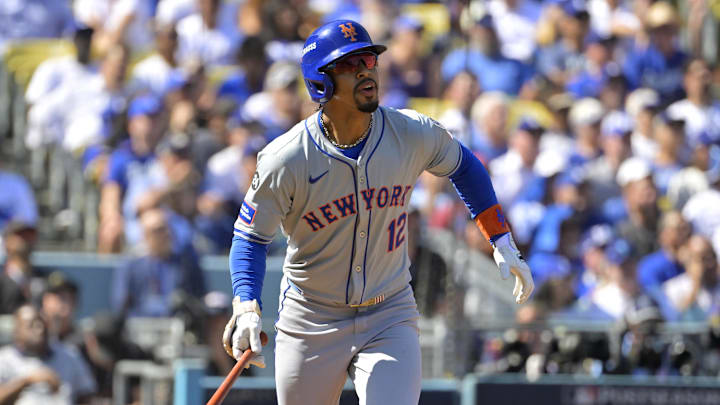Francisco Lindor’s Legend Grows in Mets’ Momentum-Shifting Game 2 Win

Over the past few weeks, as the New York Mets fought tooth and nail to reach the postseason and eventually the National League championship series with a string of hold-your-breath comebacks, shortstop Francisco Lindor has made a habit of waiting until the most dramatic moments to deliver in the clutch.
On Monday, though, he wasted no time.
Lindor opened Game 2 against the Los Angeles Dodgers with an eight-pitch at-bat that resulted in a lead-off home run, simultaneously ending the Dodgers’ record-tying postseason scoreless innings streak and making a statement that these Mets would not lie down following Sunday night’s lopsided 9–0 defeat. Following their star shortstop’s lead, New York kept the pressure on en route to a 7–3 victory to even the NLCS at one game apiece.
As he’s done so often down the stretch, Lindor led the charge on a banner day for the Mets, but he was hardly alone. With the series shifting over to New York, here are four key takeaways from Game 2.
The clock strikes midnight on the Dodgers’ pitching magic
For three-plus games, Dodgers manager Dave Roberts could do no wrong. He left Walker Buehler in to absorb innings in a Game 3 loss against the San Diego Padres in the NLDS; used eight pitchers in a bullpen game shutout with the season on the brink in a Game 4 win; then pulled his $325 million ace, Yoshinobu Yamamoto, after just five innings and 63 pitches in Game 5, covering the final 12 outs with a quartet of relief pitchers. No matter what the choice was, all of it worked, all the way through Jack Flaherty’s seven-inning gem on Sunday night that led to a third consecutive shutout.
But on Monday, the carriage turned back into a pumpkin. Opener Ryan Brasier oversaw the end of the scoreless innings streak by surrendering the leadoff homer to Lindor. Bulk reliever Landon Knack was worse, giving up five runs in the second frame that culminated with a two-out grand slam by Mark Vientos, putting Los Angeles in an early 6–0 hold.
Neither Brasier nor Knack fooled anybody in the Mets lineup. New York hitters put a dozen balls in play through the first three innings. Of those 12, eight had exit velocities over 101 mph. Seven had an expected batting average of .610 or higher. Overall, the Mets had 17 base runners for the game on 10 hits and seven walks with just six strikeouts, forcing the Dodgers to use five pitchers.
With Tuesday as a travel day, the Dodgers’ arms will get some reprieve before three straight games at Citi Field. The only other potential off day would be Saturday ahead of Game 6 in Los Angeles. Flaherty spared the bullpen in Game 1, and Roberts’s ploy to save the rest of his starters for the New York swing will now be tested. Monday represented a setback in the skipper’s strategy, but the next three games will surely provide ample opportunity for him to get back on track.
Lindor is inevitable
It was only one swing in a game that had plenty of action, but Lindor’s ability to regularly meet the moment is amazing—even when that moment comes sooner than expected.
The first plate appearance of the game can never be the most impactful, and it wasn’t today. But when each out to begin Monday’s contest meant further ensconcing the Dodgers’ pitchers in the record books, it felt important for the Mets to get the monkey off their backs, so to speak, and remind Los Angeles what it was like to not only allow its opponent to score, but to also play from behind.
So it was perfectly fitting that it was Lindor to break the dam open. The blast was the first postseason leadoff homer for the Mets since Curtis Granderson in Game 5 of the 2015 World Series, and their sixth overall. Lindor has reached base in all nine of New York’s playoff games this year.
Sean Manaea comes to the rescue
Just as it was crucial for the Dodgers to get seven innings out of Flaherty in Game 1, it was imperative for Manaea to provide some, well, relief for the Mets’ bullpen after manager Carlos Mendoza had to use four relief pitchers on Sunday. The most important of that group was lefty David Peterson, who was burned in a game the Mets had virtually no shot of winning by the time the fourth inning ended.
Manaea appeared on his way to a repeat of Flaherty’s Sunday outing before waning command (and a key error by Jose Iglesias) chased him with no outs in the bottom of the sixth. Phil Maton limited the damage to just two runs, keeping the Mets in front and helping preserve the win for Manaea.
“I thought he was really good,” Mendoza said. “Not only was he getting ahead, but staying on the attack … [the Dodgers] control the strike zone as a team. They don’t chase, so you have to get ahead, you have to execute in the zone to be able to get them.”
Even without his full complement of bullpen options, Mendoza maneuvered the late innings effectively with Maton, Ryne Stanek and closer Edwin Díaz to finish the game while keeping Los Angeles scoreless through the final three frames.
Manaea, who’s become a different pitcher since altering his mechanics during the season’s second half, kept the loaded Dodgers lineup at arm’s length most of the afternoon after getting staked to an early lead. He finished with three runs allowed (two earned) on two hits, four walks and seven strikeouts. For the postseason, he’s 2–0 with a 2.65 ERA, 17 strikeouts and six walks over three outings.
Vientos is peaking at the right time
The idea of a post-hype breakout player is always enticing—as much as we want highly touted prospects to arrive in the big leagues with immediate success, it usually doesn’t work that way. Vientos is a classic example: a former second-round pick who posted an .849 OPS in the minors, he struggled in his first two cracks at the majors in 2022 and ‘23. The third time proved to be the charm, as the 24-year-old broke out in a big way in ‘24 to become arguably the team’s second-best position player for the season after Lindor.
When the Dodgers opted to intentionally walk Lindor with two outs in the second inning to load the bases, it only added more motivation for Vientos to deliver what ended up being the game’s most impactful play.
“For sure, I took it personally,” Vientos said. “I wanted to be up there during that at-bat, for sure. I want them to walk Lindor in that situation and put me up there.”
Vientos saw his production fade a bit in the second half of the season, but he’s heating back up at the perfect time. Monday’s showing—in which he went 2-for-5 with the grand slam—was his sixth multi-hit effort in nine playoff games, raising his postseason slash line to .378/.410/.676. Lindor obviously (and deservingly) gets most of the credit for his heroics, but Vientos is on track to become an October icon himself.
